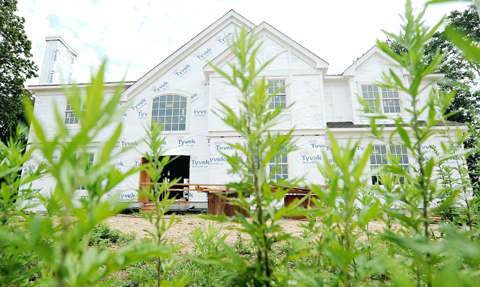Home construction plunged last month to the lowest level in the US since October last year as the economy remained weak and demand for housing plummeted.
However, driving last month’s decline was a more than 20 percent drop in condominium and apartment construction, which makes up a small but volatile portion of the housing market.
Construction of single-family homes, the largest part of the market, was down slightly. It dropped 0.7 percent.

PHOTO: EPA
Overall, construction of new homes and apartments last month fell 5 percent from a month earlier to a seasonally adjusted annual rate of 549,000, the US Department of Commerce said on Tuesday. May’s figure was revised downward to 578,000.
Homebuilders are struggling to compete with a glut of homes on the market, many of them foreclosures or deeply discounted properties.
The number of foreclosures could rise even faster, according to a new report on the US government’s flagship effort to help those at risk of losing their homes. More than 40 percent of those of those who have enrolled have dropped out of the program, the US Department of Treasury said on Tuesday.
A slumping job market and competition from foreclosed properties have forced builders to limit construction, especially after tax credits that spurred sales expired at the end of April.
“The housing market remains the Achilles heel of the recovery,” said M. Cary Leahey, a senior economist at Decision Economics. “It is hard to imagine confidence recovering to healthy levels until the housing market experiences much less distress.”
In a typical economic recovery, the construction sector provides much of the fuel. Not this time. While developers have cut back on construction and the number of new homes on the market has fallen dramatically, they still must compete against foreclosed homes selling at deep discounts.

MORE VISITORS: The Tourism Administration said that it is seeing positive prospects in its efforts to expand the tourism market in North America and Europe Taiwan has been ranked as the cheapest place in the world to travel to this year, based on a list recommended by NerdWallet. The San Francisco-based personal finance company said that Taiwan topped the list of 16 nations it chose for budget travelers because US tourists do not need visas and travelers can easily have a good meal for less than US$10. A bus ride in Taipei costs just under US$0.50, while subway rides start at US$0.60, the firm said, adding that public transportation in Taiwan is easy to navigate. The firm also called Taiwan a “food lover’s paradise,” citing inexpensive breakfast stalls

TRADE: A mandatory declaration of origin for manufactured goods bound for the US is to take effect on May 7 to block China from exploiting Taiwan’s trade channels All products manufactured in Taiwan and exported to the US must include a signed declaration of origin starting on May 7, the Bureau of Foreign Trade announced yesterday. US President Donald Trump on April 2 imposed a 32 percent tariff on imports from Taiwan, but one week later announced a 90-day pause on its implementation. However, a universal 10 percent tariff was immediately applied to most imports from around the world. On April 12, the Trump administration further exempted computers, smartphones and semiconductors from the new tariffs. In response, President William Lai’s (賴清德) administration has introduced a series of countermeasures to support affected

CROSS-STRAIT: The vast majority of Taiwanese support maintaining the ‘status quo,’ while concern is rising about Beijing’s influence operations More than eight out of 10 Taiwanese reject Beijing’s “one country, two systems” framework for cross-strait relations, according to a survey released by the Mainland Affairs Council (MAC) on Thursday. The MAC’s latest quarterly survey found that 84.4 percent of respondents opposed Beijing’s “one country, two systems” formula for handling cross-strait relations — a figure consistent with past polling. Over the past three years, opposition to the framework has remained high, ranging from a low of 83.6 percent in April 2023 to a peak of 89.6 percent in April last year. In the most recent poll, 82.5 percent also rejected China’s

PLUGGING HOLES: The amendments would bring the legislation in line with systems found in other countries such as Japan and the US, Legislator Chen Kuan-ting said Democratic Progressive Party (DPP) Legislator Chen Kuan-ting (陳冠廷) has proposed amending national security legislation amid a spate of espionage cases. Potential gaps in security vetting procedures for personnel with access to sensitive information prompted him to propose the amendments, which would introduce changes to Article 14 of the Classified National Security Information Protection Act (國家機密保護法), Chen said yesterday. The proposal, which aims to enhance interagency vetting procedures and reduce the risk of classified information leaks, would establish a comprehensive security clearance system in Taiwan, he said. The amendment would require character and loyalty checks for civil servants and intelligence personnel prior to